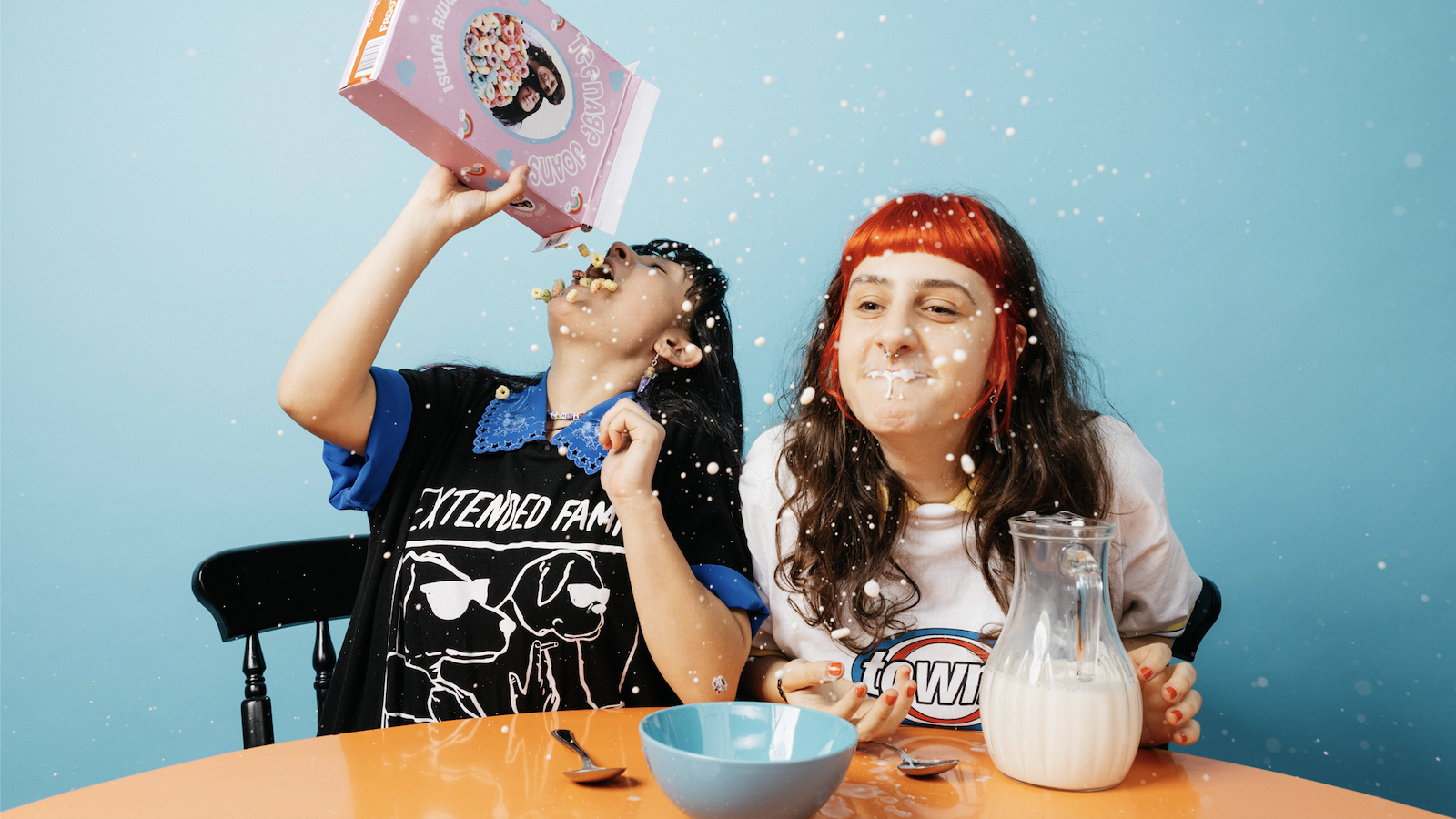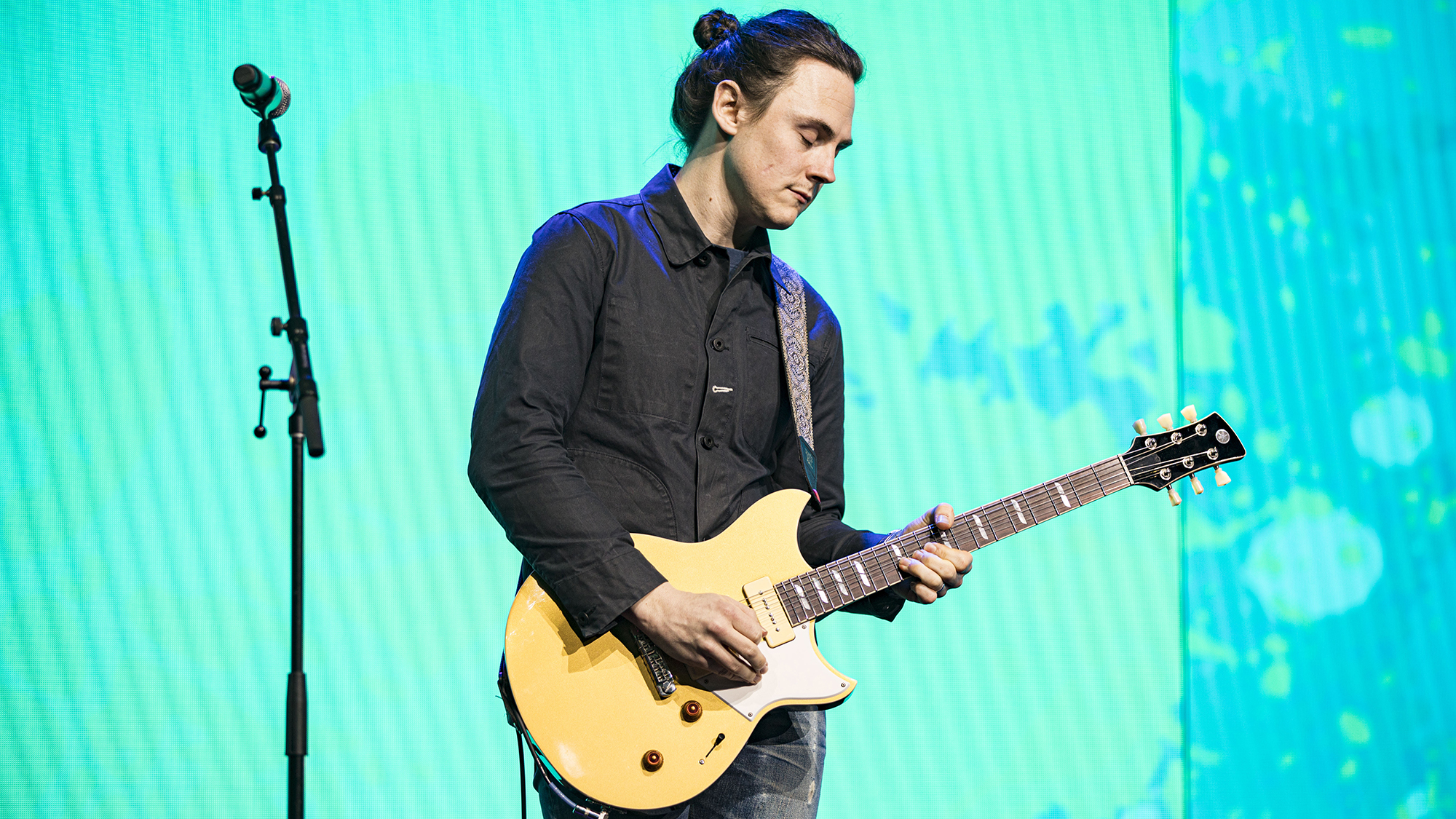Teenage Joans’ Cahli Blakers: “I don’t think a song is ever truly done as soon as we’ve finished writing it”
Teenage Joans are one of the most exciting new names in Australian alt-rock. And with their punchy and powerful debut EP, they’re making an ironclad case for their eventual reign at the top of the food chain

All the latest guitar news, interviews, lessons, reviews, deals and more, direct to your inbox!
You are now subscribed
Your newsletter sign-up was successful
It's telling how, in a time of unanimous distress, Teenage Joans were able to bring a distinct wallop of genuine, spirited excitement to Australia’s up-and-coming rock scene. They’d built a hearty local following in Adelaide throughout 2019, but with their wry and mighty 2020 single “Three Leaf Clover”, the perseverant duo burst onto the national stage. They deemed themselves underdogs in the year’s Triple J Unearthed High competition, but for those of us watching from the sidelines (AG previously championed Teenage Joans in the #138 Fresh Frets column), it was no shock at all when they scored the grand prize.
Riding that high right into the stratosphere, Teenage Joans take another powerful leap forward with their debut EP, Taste Of Me – which, as its title hints, takes the listener on a rollercoaster ride through all the peaks and valleys of their incomparable sound. The guitars are loud and lively, frontwoman Cahli Blakers diving down on her Telecaster fretboard with meteoric force, all the while doling enormous vocal hooks onto which she lays herself bare.
On a short break from shredding up a storm to sold out theatres with The Chats (in training for their own run of monster gigs later in the year), Blakers caught up with Australian Guitar to chat about how Taste Of Me came to be, why the live show is crucial to Teenage Joans’ creative genesis, and the reason she could never pull a Phoebe Bridgers on her beloved Tele…
How did you want this record to encapsulate the spirit and ethos of Teenage Joans?
We put everything into this EP. We were in the studio for nearly three weeks, I think – which doesn’t sound like a lot, but for five songs, it definitely is. And when you’re in there all day, every single day, working on the same thing for hours… I feel like I went a bit crazy in there [laughs]. But I mean, we just put in all the weird bits of ourselves, we’ve put in all of our chaos, and we’re so, so stoked on how the EP turned out. It’s very colourful and very chaotic, but still kind of cool. And I guess it’s called Taste Of Me because it is a taste of us – it’s the first full release that we’ve ever done, and… It’s our baby. There’s nothing I would change about it.
You guys have described yourselves as “juice box punk-pop”. What’s the story behind that?
I think we invented that little slogan because the binary of genre is just so small, and ‘pop-punk’ is such a small box. And especially nowadays when every genre of music is so accessible, it doesn’t make sense to have those boxes. I guess we didn’t want to fall into the pop-punk box because… Well firstly, I don’t think we’re 100 percent authentic pop‑punk, but there’s also a bit of a stigma around it. There are a lot of toxic men in the pop-punk scene, and we don’t want to fall into that sort of toxicity. But we do recognise that we are pretty close to pop‑punk in sound.
We made it rhyme with ‘juice box’ because we’ve used that term in the past to describe the youthfulness of our lyrics. We try to write about real struggles and real problems, but in a more fun, easy‑to-consume way, so that everyone can relate to it.
How quickly did this EP come together between the two of you?
We’re actually pretty fast writers when we’re both together. When I’m on my own I get nothing done, because I hate everything I do. But I think that’s why this band works so well – I usually start a song in my bedroom by myself, and then I take it to Tahlia and she helps me finish it. And we’ll usually finish it together in the span of a few hours, once we sit down and actually put our heads together. But I don’t think a song is ever truly done as soon as we’ve finished writing it.
All the latest guitar news, interviews, lessons, reviews, deals and more, direct to your inbox!
The last song on this EP, “Therapist” – this is the second recording of it. We first recorded it when we did “Three Leaf Clover” and “By The Way”, which were songs we’d had for a few months – but we wrote “Therapist” just before the recording session, and it just didn’t work out. I think it was mostly because we hadn’t played it live yet. The live show is such a huge part of Teenage Joans – we’re so proud of it, and I really think our songs take on a life of their own during the show, without us even consciously realising it. We just do different things and slip into new habits with the song that, after a while, just makes it what it really is. So I think it usually takes a few months for a song to reach its truest, best form, and become ready to record.
And then obviously there’s the recording process, the mixing and mastering… It can take a long time! These songs took almost two years in the end.
Let’s talk gear! What guitars were you ripping out on for this record?
I have my US Telecaster, and that’s my baby. I named her Courtney, because there are so many rock goddesses named Courtney – Courtney Love, Courtney Barnett… It’s just an iconic ‘badass woman in the rock scene’ name, so I had to name my guitar Courtney. That’s pretty much the only guitar I used for the whole thing, and we just played with different amp and pedal tones. I did also use… I can’t remember the brand of the guitar, but my friend has a baritone that I used on “Wine”.
This is a little secret that I probably shouldn’t be telling anyone, but “Wine” and “Something About Being Sixteen” have pretty much the same chord progression – so to sort of separate them from being the exact same song, I used a baritone on “Wine”, which gives it more of a middle-ground tone. It was a very hard guitar to play; it feels like strumming a bass.
What is it about the Tele that just makes your heart skip a beat?
A lot of the artists I look up to have used Teles, and I think it’s got that really beautiful punky sound. Even without pedals, if you just plug it clean into an amp, it has this almost crunchy sound, and it’s so effortlessly tough… But like, in a soft way. It’s got such a nice clean tone, but it has an edge to it as well.
What is your philosophy behind using the guitar as a way to set a mood or tell a story?
Our producer is amazing because he didn’t bring in all these fancy instruments and be like, “Play this because it sounds good.” He just let us use what we had, and I think that in itself is what makes the recordings feel so good. I think you get such a homey vibe from them, because we’re both just using our own instruments.
This is the guitar I play live, it’s the guitar I play in my bedroom, it’s the guitar I play when I go to my friend’s house to have a jam, it’s the guitar I play in practises… It’s the guitar I use everywhere, and it’s almost like a part of me; it’s like an extra limb that I just have to carry around in a case. I always see bands smash guitars onstage and I’m like… Maybe I could buy a cheap one to smash one day, but I would never do that to my Tele – she’s my baby! I just know my way around it as well – I feel like even if I picked up another Tele of the same model, it wouldn’t feel 100 percent exactly the same.

Ellie Robinson is an Australian writer, editor and dog enthusiast with a keen ear for pop-rock and a keen tongue for actual Pop Rocks. Her bylines include music rag staples like NME, BLUNT, Mixdown and, of course, Australian Guitar (where she also serves as Editor-at-Large), but also less expected fare like TV Soap and Snowboarding Australia. Her go-to guitar is a Fender Player Tele, which, controversially, she only picked up after she'd joined the team at Australian Guitar. Before then, Ellie was a keyboardist – thankfully, the AG crew helped her see the light…
